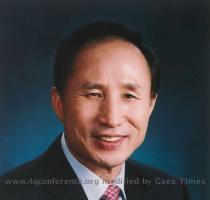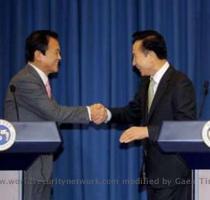SKorea’s Lee urges NKorea to stop engaging in provocation, proposes path toward unification
By Hyung-jin Kim, APSunday, August 15, 2010
SKorea leader urges North to halt provocations
SEOUL, South Korea — South Korea’s president urged North Korea to abandon its military provocations and make a “courageous change” toward peace, using a speech Sunday marking the Korean peninsula’s liberation from Japanese rule to outline a path for its eventual reunification.
President Lee Myung-bak made the offer even as relations between the two Koreas are at their lowest point in years following the March sinking of a South Korean warship, which Lee said Sunday was “unprovoked attack” by North Korea.
“The North must never venture to carry out another provocation, nor will we tolerate it if they do so again,” Lee said.
Tensions on the divided peninsula deepened last week when North Korea fired a barrage of artillery into the sea, some of them into South Korean waters.
On the 65th anniversary of Korea’s liberation at the end of World War II, President Lee Myung-bak called on North Korea to heed calls to improve ties with South Korea.
Lee also said that South Korea should prepare for unification with North Korea by studying measures including the adoption of a unification tax aimed at raising money for the costs of integration.
Dressed in Korean traditional costume, Lee spoke after officials unveiled the restored main gate at the former royal palace. The Gwanghwamun gate symbolizes Korea’s turbulent modern history, as it was once torn down and rebuilt at a different site to make room for the Japanese governor’s building during the colonial period before it was destroyed again during the 1950-53 Korean War and rebuilt in 1968.
Speaking before a crowd of people, Lee said North Korea must face reality and make a “courageous change.”
To achieve that, he proposed a three-stage unification, in which the two Koreas first form a “peace community” involving denuclearization on the peninsula, then an “economic community” for cross-border economic integration and eventually a “community of the Korean nation” with no institutional barriers between them.
“Through this process, we can ultimately bring about the peaceful unification of Korea,” Lee said.
His plans are aimed at upholding a 1994 unification scenario by Seoul that proposed the Koreas reconcile and form a federation before building a unified nation, according to Lee’s office.
There was no immediate reaction from North Korea on Lee’s proposal, though it’s unlikely for the regime to accept it given deteriorating ties between the countries.
North Korea — which denies attacking the Cheonan — has recently vowed to expand its nuclear arsenal in protest.
On Japan, Lee said that Seoul and Tokyo should never forget history but work together to develop a new future.
Last week, Japan’s prime minister offered a renewed apology for his country’s past wrongdoing, saying that he “would like to express once again our deep remorse and sincerely apologize” for the suffering caused by the colonization. Naoto Kan’s apology was issued ahead of the 100th anniversary of the Japanese annexation of the Korean peninsula that falls on Aug. 29.
“I have taken note of Japan’s effort, which represents one step forward,” Lee said of Kan’s apology.
“However, there still remain issues that have to be resolved,” he said. “The two countries are called upon to take concrete measures to forge a new relationship for another 100 years.”
Many older Koreans still harbor strong resentment against Japan over the colonization. Hundreds of thousands of Koreans were forced to fight as front-line soldiers, work in slave-labor conditions or serve as prostitutes in brothels operated by the military.

